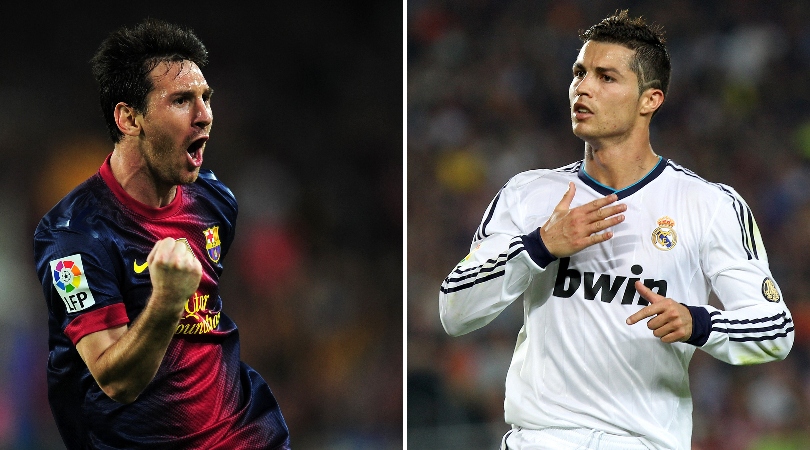Greatest individual seasons: Fergie rips up the Man United rulebook for Robin van Persie (2012/13)
A manager smarting from Manchester City's success and a player thirsting for long-awaited glory joined forces. Gary Parkinson on how a dominant Dutchman gave Alex Ferguson the perfect send-off
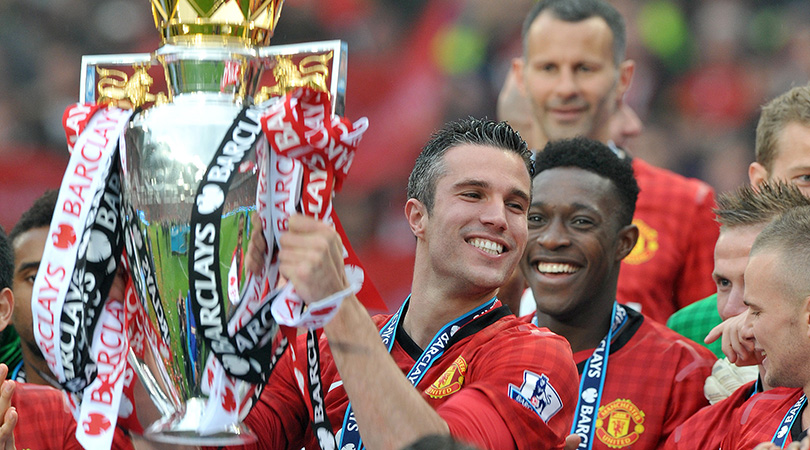
It may seem peculiar, in a series highlighting greatest individual seasons, to nominate a title-winning Manchester United player. Since that phrase is now yellowing around the edges, it’s worth recalling that Alex Ferguson always prioritised the team over the player; certain useful individuals might be indulged – a stubbornly-turned blind eye here, a structure-busting pay rise there – but only for as long as they served the unit.
But one of Fergie’s great strengths was the self-belief to change as occasion arose. And by signing Robin van Persie, he rapidly discarded one of United’s most closely-clutched business shibboleths: Thou Shalt Not Sign Old Players, For They Have No Resale Value.
Van Persie was 29 by the time he signed for United. Ever the proponent of youth, Fergie hadn’t gone for such a long-toothed outfield old-timer since summer 1997, when he had paid Tottenham £3.5m for the 31-year-old Teddy Sheringham.
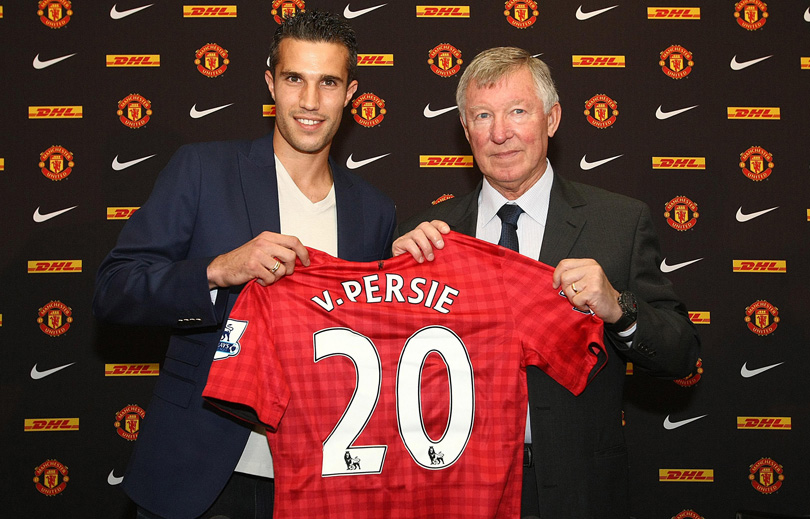
That was in response to the potential existential crisis of Eric Cantona’s sudden retirement. Fifteen trophy-filled seasons later, another raid on north London was prompted by a very different war footing: Manchester City had won the league.
Roberto Mancini spent north of £50m on Javi Garcia, Matija Nastasic, Maicon, Scott Sinclair and Jack Rodwell... Fergie paid less than half of that for the man who would win him his final title
Not only that, but City’s petrodollar-turbocharged glory-hoover was threatening to suck in every available jewel from domestic rivals. The previous summer, besides signing Sergio Aguero from Atletico Madrid, City had lured Gael Clichy and Samir Nasri north. When they wooed Van Persie, whose feet were growing itchy in an underachieving Arsenal team, Fergie flew into action.
The Dutchman had scored against 17 of Arsenal’s 19 league opponents during 2011/12, racking up 30 goals plus another seven in the cups and winning both Player of the Year gongs. Tired of trying to drag the Gooners single-handedly along behind the title race, he announced his intention to leave, and Ferguson leveraged United’s history to tempt him to the red half of Manchester.
There were gasps when United paid an initial £22.5m, with a £1.5m bonus should they win the league or Champions League during Van Persie’s four-year contract. History proves it a wiser deal than City’s summer business. During August 2012, Roberto Mancini spent north of £50m on Javi Garcia, Matija Nastasic, Maicon, Scott Sinclair and Jack Rodwell, none of whom amounted to much more than a footnote in City’s history. Fergie paid less than half of that for the man who would win him his final title.
Get FourFourTwo Newsletter
The best features, fun and footballing quizzes, straight to your inbox every week.
9.5 x 2 = 20 (titles)
The season didn’t start with great promise: United lost their Monday night opener at David Moyes’s Everton. By the time Van Persie emerged from the bench, Marouane Fellaini had already scored the winner. But five days later the Dutchman started against Fulham, and although Damien Duff rapidly put the visitors in front, Van Persie’s 10th-minute leveller set his team en route to a 3-2 win.
More crucially, second-half sub Wayne Rooney suffered a gashed leg which would rule him out for a month. Many had wondered how Ferguson might accommodate two split strikers who preferred playing at “nine-and-a-half”, to use Van Persie’s phrase. By the time the Scouser returned, the new boy was on five goals in three starts.
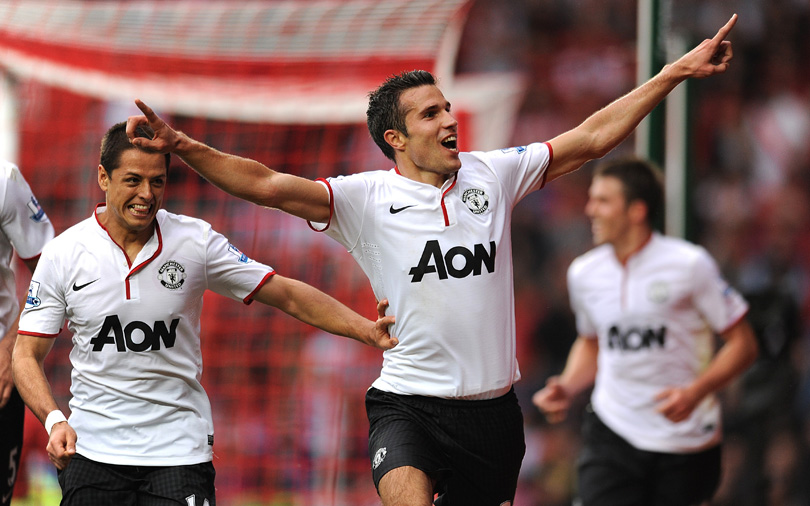
And these were not grace goals. In the 3-2 win at Southampton he equalised twice, latterly in the 87th minute, before completing the hat-trick and victory in the 93rd minute. After a breather on the bench as a scratch team beat Wigan, he wasn't rested again in the league until after Christmas.
Frankly, United needed him. Alex Ferguson produced some Manchester United teams whose dominance was almost embarrassing, but this was more of a unit that did just enough. Across the 38 league games they conceded 43 goals – their highest total in a decade, 10 more than the previous campaign, and the same number Moyes’s men would allow the following year – but won 16 games by single-goal margins.
Ten of those narrow victories featured at least one of Van Persie’s 26-goal haul; he also scored in four draws. Factor in his 15 assists, and tangible statistical influence borders on phenomenal. His goals or assists turned five losses into draws, 13 draws into wins and four losses into victories. To expunge someone’s input from the record is evidently reductive but also sometimes instructive: without his goals and assists, United would have been 43 points poorer.
The influencer
Nor was Van Persie a flat-track bully: he couldn’t be, such was the scope of his influence. Across the 38 games, the only three teams he didn’t score against were Norwich, QPR and Swansea, but he racked up assists against all three of those and plenty besides. That season, no Premier League opponent avoided conceding a goal scored or assisted by Van Persie.
If the Anfield penalty winner had showed a nerveless ability to dictate the narrative, the sequel was unabashed Hollywood
On his third start, he scored the 81st-minute winner at Anfield from the penalty spot. Four games later (after assists against Spurs and Newcastle, plus a goal and an assist against Stoke) at Stamford Bridge, he followed up his fourth-minute deflected goal off David Luiz with a cool 10th-minute finish; United won 3-2. Next up were Arsenal at Old Trafford: he scored within three minutes – right-footed – to give the Red Devils a lead they never lost.
That win put them top before Bonfire Night, and from that point they spent all but one week there. Van Persie could score vital early goals – West Ham held out for all of 32 seconds – or he could join in with others: after a freakish opening half-hour at Reading, his 34th-minute goal put United 4-3 up and the scoring stopped there, as if the headmaster had arrived to quieten schoolkids running riot around a substitute teacher.
He could also score late goals. So he did. If the Anfield penalty winner had showed a nerveless ability to dictate the narrative, the sequel was unabashed Hollywood. In the Manchester early-December derby, the Etihad had been rocked by Rooney’s early double but the champions had fought back to equalise in the 86th minute. Two minutes into overtime, Van Persie stepped up to curl a free-kick past his flinching former colleague Samir Nasri and into the City net. Not only had the noisy neighbours been quietened, the lead at the top stretched to six points – and unlike in the spring, City weren’t coming back from that.
Onwards he ploughed, a metronomic marksman. The derby was one of 10 consecutive league games in which Van Persie scored, assisted or both; in eight of them, his interventions materially affected the results. On Boxing Day at Old Trafford, Newcastle took the lead three times; the Dutchman set up the Red Devils’ second equaliser, scored their third and was part of the charge to yet another 90th-minute winner.
When Liverpool came to town, he took just 10 minutes to put United ahead and on course for a ninth win in 10. A week later at Spurs, he put them ahead again, but this time the late hero was Clint Dempsey with a 93rd-minute equaliser.
There followed a fallow patch of one Van Persie goal in eight games – although he contributed four assists and United kept winning. The title race was all over bar the shouting from the Old Trafford away end when Man City’s 2-1 victory at Old Trafford cut the gap at the top to a mere 12 points.
On Monday 22 April, United hosted Aston Villa knowing victory would seal their 20th top-flight title, matching the shirt number Van Persie had adopted when Rene Meulensteen convinced him he could help them reach that target. Amid a party atmosphere, Van Persie scored within two minutes, doubled the lead on 13 minutes and completed his hat-trick on 33.
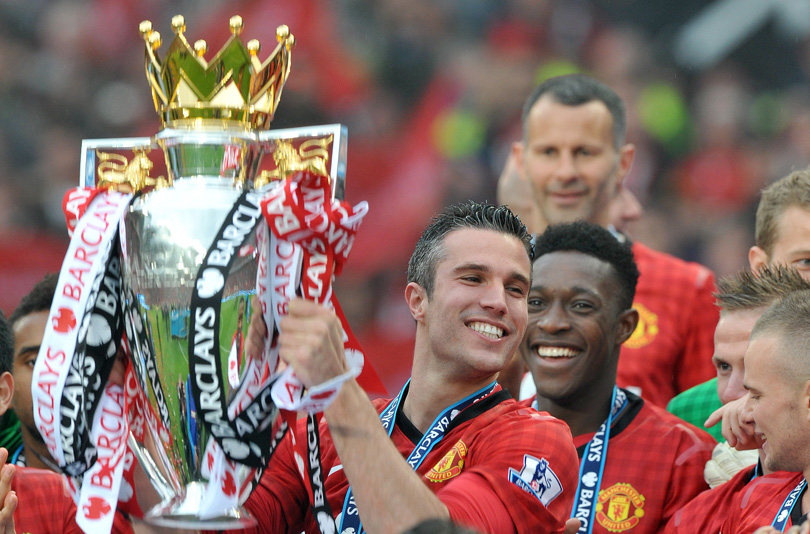
He ended the season on 26 league goals. Apart from Rooney’s 12 and permasub Chicharito’s 10, nobody else got more than half a dozen. The previous season, United had benefited from five players scoring seven or more – supporting acts like Nani, Dimitar Berbatov and Danny Welbeck sharing the load, while Rooney bagged 27. In 2012/13, Van Persie scored more than 30% of United’s goals; add in his assists and his input reaches 48%.
Perhaps more than that, his signing was a howl of defiance against Manchester City, a statement of United’s preciously-held importance. Van Persie had been courted by the nouveau-riche crosstown arrivistes, but couldn’t compete with United’s calling cards of history and emotion. As the Dutchman explained: “When you have to make a hard decision in your life, I always listen to the little boy inside me: What does he want? That little boy was screaming for Manchester United.”

Ferguson, for his part, could finally retire in relative contentedness. The previous summer, the manager had talked up his big new signing as “a finished player”, a ready-made “catalyst” – Cantona was mentioned as a comparison – who “gives us a sort of certainty for the future… I think we will benefit for the next four years and beyond.”
It didn’t quite turn out that way. Groin, knee and hamstring injuries restricted Van Persie to 21 league games (12 goals) in Moyes’s doomed 2013/14 campaign. The following year it was 10 in 27 under compatriot Louis van Gaal until a typically combustious inter-Dutch relationship ended in Van Persie leaving for Fenerbahce in July 2015.
For all that, Fergie’s final gamble had certainly paid off in the short-term. We may never know how much he realised that his final squad was overachieving, that he had made them more than the sum of their parts, and that Van Persie was a short-term solution to a long-term problem. But what a solution.
Gary Parkinson is a freelance writer, editor, trainer, muso, singer, actor and coach. He spent 14 years at FourFourTwo as the Global Digital Editor and continues to regularly contribute to the magazine and website, including major features on Euro 96, Subbuteo, Robert Maxwell and the inside story of Liverpool's 1990 title win. He is also a Bolton Wanderers fan.
